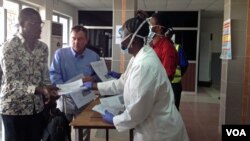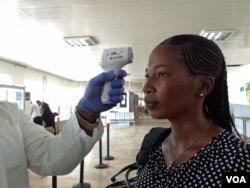Sierra Leone is still battling to get the deadly Ebola epidemic under control. One of the more important measures to stop the spread is screening air travelers for the virus.
Only three airlines have continued operating in Sierra Leone since the Ebola crisis hit. There used to be nine. Still, the airport can be a busy place.
Ebola checkpoints are everywhere, from the moment one enters the airport gates until the final boarding call. Hand washing with chlorine and temperature checks are mandatory.
Passengers arriving are also screened.
During the process, everyone has to fill out a health declaration card. Doctors and nurses are also on site. And an isolation ward is ready should there be a suspected Ebola case.
Monitoring teams are out making sure everything is being done properly by medical staff.
Ben Potter, project manager for the monitoring, said he prefers doctors to be “more cautious than not."
"I would rather they stopped someone because they were overly cautious, rather than not stop someone with Ebola and let them go on a plane,“ he said.
The IOM project has two monitoring teams which started in November. The U.S.-based Centers for Disease Control and Prevention is funding the pilot project and Potter said they hope to expand it to Liberia and Guinea.
George Tucker is a senior monitor. He said sometimes it is challenging because passengers complain about the number of checkpoints before boarding a flight. The monitors have to act accordingly.
“We need to come in and calm them down, tell them the importance and how it can be important to you, me, the community as a whole,” he said.
On several occasions, passengers departing the country have shown Ebola-like symptoms such as a high fever and been sent to a treatment center for testing near the airport. None of those passengers was confirmed to have Ebola, though.
Dr. Maclean Sanah works at the departure gates checking health declaration cards and questioning passengers to see if they may have been exposed to the virus.
He said because cases have been decreasing across the country, he worries people may become too relaxed in general.
“I’m very much worried [because we have that kind of attitude] and we get complacent the moment figures start going down and we know a single case can just turn whole picture all over again,” he said.
Indeed, Ebola cases increased in Sierra Leone in the last week of January after several weeks of steady decline.
One aspect IOM has improved on is beefing up checks at the main gate where people first enter the airport.
Ten more officers are now there, taking temperatures, storing all the information in a log book. Staff now consistently check the chlorine levels for hand washing.
Once a month, Potter also runs an emergency simulation exercise so staff have a better idea of how to handle difficult situations such as a person who is suspected of having Ebola and becomes aggressive.
“It helps you identify gaps you wouldn’t normally think about once you go through the process and see on ground you can identify much easier,” he added.
He said all this is crucial because other airlines may start operating soon and the big challenge will then be getting more staff trained and monitoring 24 hours a day.





